God’s odd turns
They’re on purpose
P.






P.





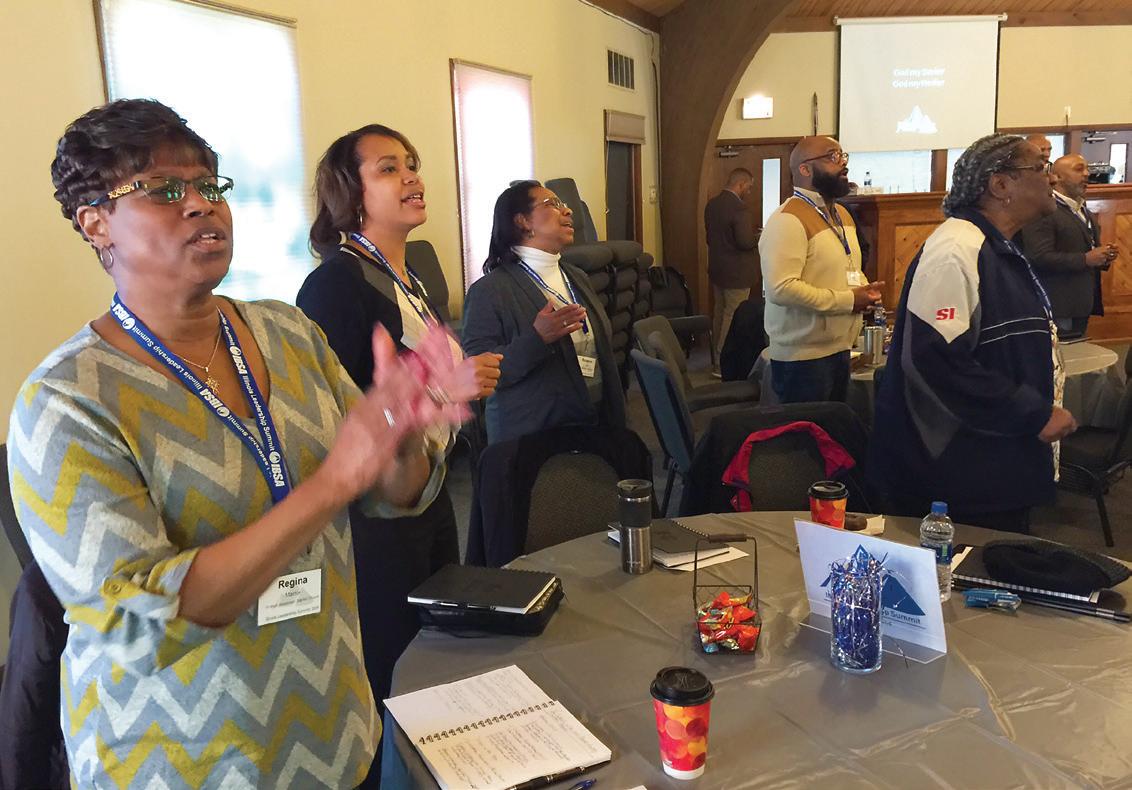
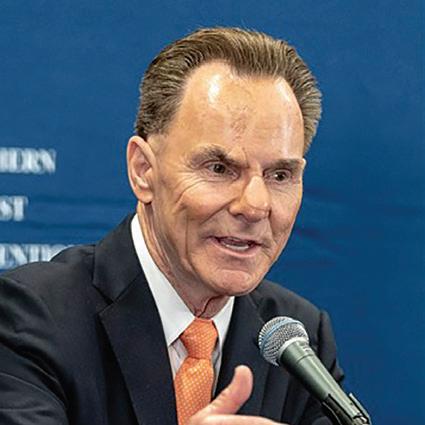

Nashville, Tenn. | When Ronnie Floyd began his tenure as president and CEO of the Southern Baptist Executive Committee this month, he immediately became a key piece of how the denomination will respond to major challenges: preventing sexual abuse in churches and caring for survivors; building leadership that reflects the diversity of Southern Baptist churches; and reigniting a passion for evangelism amid years of declining baptisms and church membership.
The search team that nominated Floyd, 63, chose him because of his decades of leadership and his vision for the SBC. They’re counting on the longtime pastor’s experience to help the SBC navigate challenges, now and in the future.

“We needed a proven leader,” said Adron Robinson, pastor of Hillcrest Baptist Church in Country Club Hills and president of IBSA. Robinson, who also serves as one of Illinois’ two representatives on the Executive Committee, was vice chairman of the search committee. He noted Floyd’s decades of pastoring a vibrant, baptizing, church-planting church.

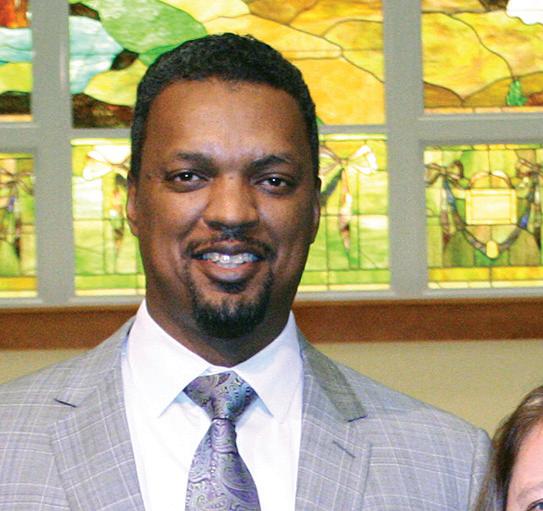
“Despite the fact that church leaders overwhelmingly agree that parents are most responsible for a child’s spiritual formation and development, the data demonstrate that churches place little emphasis on training and equipping said parents.”
– Barna Research
family values
Barna asked Protestant pastors how their churches prioritize children’s spiritual formation:
Sunday school/class for youth
Encourage participation in church worship service
Camps or Vacation Bible School
Worship services for children
Training children in spiritual disciplines
Training parents for spiritual conversations
Enabling kids’ participation in sacraments
Providing guides or other resources to parents
Catechism, communicants’, or sacramental prep class
School that is affiliated with church
– Barna, March 2019
the cooperative program
Giving by IBSA churches as of 4/5/19
$1,554,306
Budget Goal: $1,550,000
Received to date in 2018: $1,506,455
2019 Goal: $6.3 Million
Editor - Eric Reed
Managing Editor - Meredith Flynn
Graphic Designer - Kris Kell
Contributing Editor - Lisa Misner
Multimedia Journalist - Andrew Woodrow
Administrative Assistant - Leah Honnen
The general telephone number for IBSA is (217) 786-2600. For questions about subscriptions, articles, or upcoming events, contact the Illinois Baptist at (217) 391-3119 or IllinoisBaptist@IBSA.org

The Illinois Baptist is seeking news from IBSA churches. E-mail us at IllinoisBaptist@IBSA.org to tell us about special events and new ministry staff.

POSTMASTER: The Illinois Baptist is owned and published every three weeks by the Illinois Baptist State Association, 3085 Stevenson Drive, Springfield, Illinois 62703-4440. Subscriptions are free to Illinois Baptists. Subscribe online at IBSA.org.

Apastor friend of mine recently told his congregation that he has preached on money, either an individual message or an entire series, at least once a year throughout his 30 years of ministry. When asked if he could tell whether it made a difference in giving to the church or not, he had to admit he didn’t really know. After all, that’s not why he did it.
Why does this pastor, and why do many effective pastors, speak regularly on the subject of money? Because money, and the effect it can have on people, is one of the most prominent subjects in the Bible, and one of the most important topics a true disciple of Jesus must consider.
Jesus talked more about stewardship, or the management of resources that God entrusts to us, more than heaven, or hell, or faith, or prayer, or a lot of other things. Over half of Jesus’ parables are about stewardship, and one out of every six verses in the Gospels has to do with stewardship.
Understanding stewardship is one of the keys to understanding the Christian life. If we don’t understand that God owns everything, that we are uniquely created in God’s image to be stewards of his creation, and that how we manage the resources God entrusts to us personally is a test of our faith in him, we will allow those very resources to tempt us into selfishness and even self-destruction. Money and possessions can quickly become the focus and goal of our lives. In fact, as the Bible says, the love of money is the root of all evil.
No wonder The Baptist Faith and Message (2000) speaks so clearly to the biblical doctrine of stewardship in its Article 13:
“God is the source of all blessings, temporal and spiritual; all that we have and are we owe to him. Christians have a spiritual debtorship to the whole world, a holy trusteeship in the gospel, and a binding stewardship in their possessions. They are therefore under obligation to serve him with their time, talents, and material possessions; and should recognize all these as entrusted to them to use for the glory of God and for helping others. According to the Scriptures, Christians should contribute of their means cheerfully, regularly, systematically, proportionately, and liberally for the advancement of the Redeemer’s cause on earth.”
When our boys were young, my wife, Beth, always gave them their weekly allowance on Sunday mornings, along with their church offering envelope. She made sure to give them dollar bills and some loose change, making it easier to calculate a tithe of 10%. As our own parents modeled for us, tithing is best taught at an early age.
One Sunday morning we noticed our youngest son, Ethan, placing all five dollars of his allowance in his offering envelope. “Son, you don’t need to give your entire allowance to the offering,” his mom assured him.
Ethan smiled and said, “I know. But you and Dad always give me everything I need. So this week I thought I’d just give it all.”
Generosity is the antidote to materialism. I think that’s why my pastor friend, and many effective pastors, choose to preach about money regularly. Some people will misunderstand and feel those pastors are simply seeking more money for the church. But avoiding sermons on money for fear of that perception would be a disservice to the congregation. Disciples that are growing to be more and more like Jesus are learning to loosen their grip on money, and thereby money’s grip on them. They are finding in generosity the true freedom from materialism that God desires for his people.
Nate Adams is executive director of the Illinois Baptist State Association. Respond at IllinoisBaptist@IBSA.org.

Generosity is the antidote to materialism.
Continued from page 1
“That type of sustained leadership of a healthy ministry said a lot about his leadership capacity.”
Floyd, who was elected April 2 by a vote of 68-1, pastored Cross Church in northwest Arkansas for 33 years. He is a former president of the Southern Baptist Convention (2014-2016), and also chaired the Great Commission Task Force (2009-2010) and the Executive Committee (1995-1997). He succeeds Frank Page as head of the Executive Committee. Page resigned in March 2018 after confessing a morally inappropriate relationship.
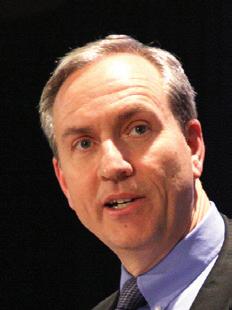
The search team believed Floyd’s experience is needed now, Robinson said, as the SBC addresses sexual abuse and tries to help churches care well for victims and prevent future incidences. A February report in the Houston Chronicle detailed hundreds of cases of sexual abuse involving Southern Baptist church leaders and volunteers.
process online. But the men tapped to fill recent leadership posts are Gen X-ers, and some are associated with more Reformed theology. Floyd is neither, which Robinson said should give the SBC a “balanced bullpen” of leadership.
“I think it’s good to have a diversity of leadership styles: Reformed, traditional, Calvinist, and non-Calvinist, and we all need to work together for the glory of God.”
At a press conference following his election, Floyd acknowledged his years of experience in his response to a question, posed by the Illinois Baptist, about the generational differences between him and other current leaders. “The search committee felt they needed a seasoned leader for such a time as this in Southern Baptist life,” Floyd said.
At this time, only two of five key vacancies in SBC leadership remain unfilled. Paul Chitwood, 46, was named president of the International Mission Board in November, and Adam Greenway, 41, assumed leadership of Southwestern Baptist Theological Seminary in February. Search committees are seeking leaders for New Orleans Baptist Theological Seminary following the retirement of Chuck Kelley, 66, and LifeWay Christian Resources, whose president, Thom Rainer, 63, left in February.
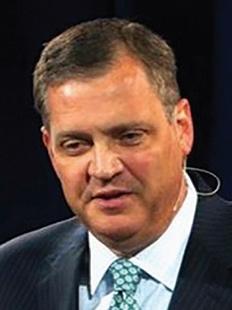
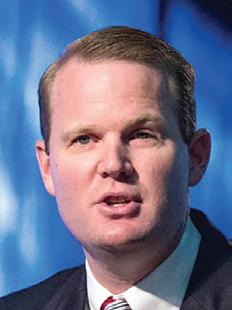


J.D. Greear

President, Southern Baptist Convention
“He is a man of prayer and a man of action; a man of prudence and a man of boldness...He is a gifted leader who I believe will keep the gospel above all.”
Nate Adams
IBSA Executive Director
“Dr. Floyd is a gifted and experienced pastor and a respected national SBC leader who has been well prepared for this role. I look forward to working with him, and to seeing his vision unfold for the Executive Committee and our work together as Southern Baptists.”
Jason K. Allen
President, Midwestern Baptist Theological Seminary
“It’s ungodly, it’s sinful, it’s criminal and obviously we would be against it,” Floyd said during post-election meetings with various Baptist leaders and groups. “But how we get to the common path of what we do, that has become the issue.”
In February, the Executive Committee approved an amendment to the SBC Constitution that would designate churches that exhibit indifference toward sexual abuse to be not in friendly cooperation with the SBC. To become part of the Constitution, messengers to the 2019 and 2020 SBC annual meetings must approve the ammendment by a two-thirds majority.
In a Facebook Live session following his election, Floyd said Southern Baptists seem poised to unite at the 2019 SBC annual meeting in Birmingham, Ala., and make “as declarative a statement as we can make to our culture about what we believe about this issue” of sexual abuse.
Floyd’s experience as an SBC leader and megachurch pastor made his nomination unsurprising to many discussing the nearly year-long
Robinson said the vision Floyd presented for the SBC is “multigenerational, multiethnic, and multilingual.” At the 2015 Southern Baptist Convention in Columbus, Ohio, then-SBC President Floyd gathered pastors and leaders from multiple ethnic groups to pray corporately for racial reconciliation. The next year, he invited National Baptist Convention President Jerry Young and other leaders to engage in a panel discussion on racial unity in America.
His frequent communication with Baptists through blog posts and social media was a hallmark of Floyd’s SBC presidency, and Robinson said that will continue as Floyd assumes his new role.
“I think that’s going to be part of his mission, to get the story of the SBC out to the rest of the world. To highlight the things we’re doing well, so that we’re not just known for what we’re against, but what we’re for, and what we’re doing to fulfill the Great Commission.”
That charge to make disciples of all nations— given by Jesus to his followers in Matthew 28:19-20—is the “missional vision” of Southern Baptists, Floyd said after his election. “It will be to that end, that end of reaching the world that I will give my life…in this next season—100 percent, from before daylight until exhaustion, until Jesus comes or until he calls me home.”
– Meredith Flynn, with reporting from Baptist Press




“As SBC president, Dr. Floyd pursued denominational unity by reaching out across generational, theological, and ethnic lines; he pursued denominational renewal by focusing on spiritual awakening, personal evangelism, and fulfilling the Great Commission; and he pursued denominational expansion by championing the Cooperative Program. I’m confident Dr. Floyd will do the same in this new leadership post, and I’m more hopeful for the SBC’s future with him at the helm of the Executive Committee.”
R. Albert Mohler Jr.
President, Southern Baptist Theological Seminary
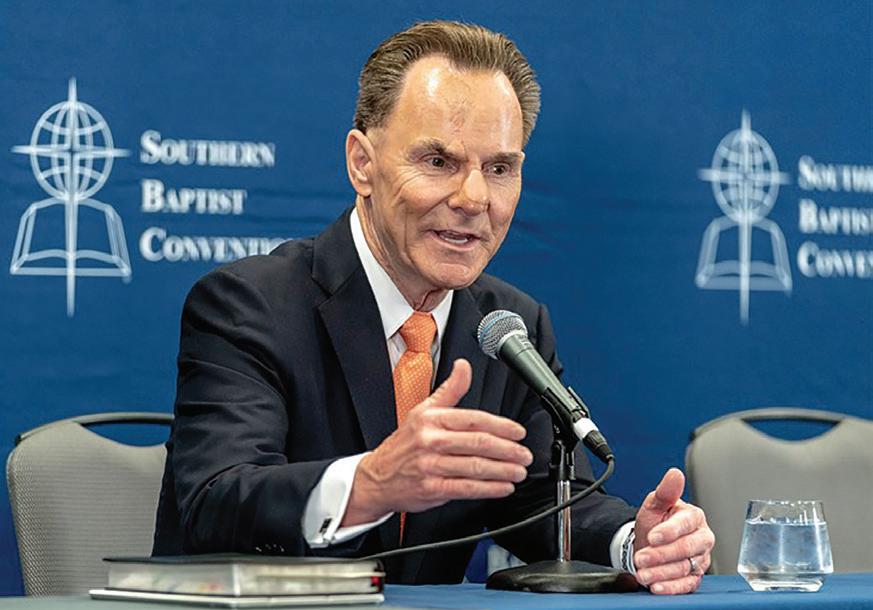
“There is no pastor in the SBC today who has more experience in denominational life and leadership. He is deeply committed to the SBC and is passionate to see Southern Baptists reach a lost world for Christ. His commitment to the Cooperative Program is clear and he leads by example.”
Sandy Wisdom-Martin Executive Director-Treasurer, Woman’s Missionary Union
“We are at a critical hinge in history. We need people who will lead us on an unshakable pursuit of God and his mission. We will pray for Dr. Floyd as he transitions to this new Kingdom post and look forward to working with him.”
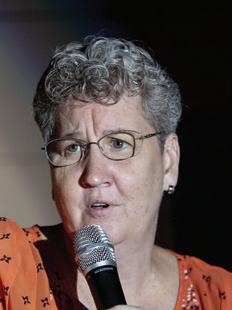
MAdams also outlines seven church needs eeting for the first time in 2019, the IBSA Board of Directors reviewed and passed a “Statement of Principles Concerning Sexual Abuse” on March 26 at the IBSA Building.
Recent news coverage by the Houston Chronicle and other media outlets revealed hundreds of cases of abuse by Southern Baptist ministers and volunteers. Following the revelations, Southern Baptist Convention President J.D. Greear proposed a Statement of Principles concerning sexual abuse. The Board’s Administrative Committee recommended the full IBSA express its support of the statement, which the Board did unanimously.
Greear asked state conventions to adopt the statement in conjunction with the SBC, stating they “are committed to partnering to engage the issue of abuse with compassion and care. Our desire is for churches and ministries in our states to become safe for survivors and safe from abuse.”
The three main principles of the statement are:
• Our state conventions will continue to address sexual abuse issues.
• Our state conventions will care for abuse survivors.
• Our state conventions will continue to prepare for abuse prevention.
Read the full statement at https://bit. ly/2uNrwXo.
In his report to the Board, IBSA Executive Director Nate Adams presented the top seven challenges facing IBSA as the organization sets goals for 2020. The challenges were determined largely from responses to the 2018 Church Needs Survey.
Adams said churches expressed a need for help with:
1. Revitalization, evangelism, church growth;
2. Reaching younger adults and students;
3. Effective discipleship and Bible study;
4. Inspiring biblical stewardship and missions giving;
5. Leadership development processes that actually help impact church health and growth;
6. Making positive, helpful, relational, connections with IBSA; and
7. Getting ready for hands-on involvement in church planting, especially in non-urban areas of Illinois.
These needs are being addressed in part through follow-up with the 255 churches that signed up for the Pioneering Spirit Challenge (pioneeringspirit.org). IBSA is also delivering increasingly focused and practical training, online resources such as the Resource Center, an increase in video production, and member engagement strategies, as well as a new initiative, “Everyone Hears,” with Eddie Pullen.
Adams reported IBSA is also working on the intentional deployment of accumulated reserves and more part-time staff, along with re-evaluating structure for 2019-2020.
In other business, the Board recognized IBSA staff with 10, 20, and 30-year employment anniversaries, and also approved:
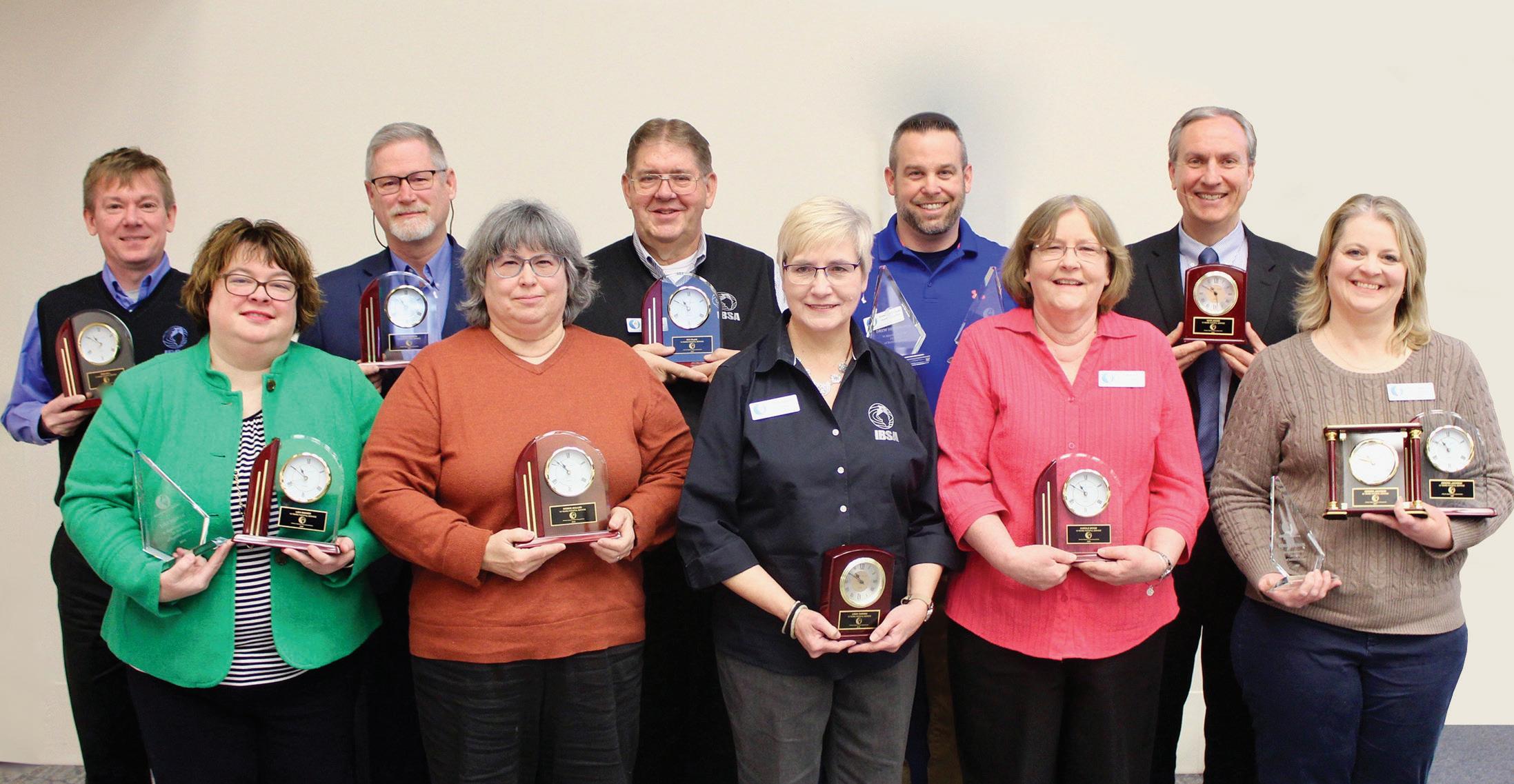
- The Resource Development Committee’s recommendation that the Cooperative Program goal for 2020 continue with 56.5% of the funds remaining in Illinois and 43.5% going to the SBC Executive Committee. The amount excludes shared expenses not to exceed 10% of the CP goal, and for funds received beyond the budget goal to be distributed at a ratio of 50/50.
- The 2018 audit by accounting firm CapinCrouse LLP. Curt Lipe, Resource Development Committee chair, described the audit as “a very positive, very clean opinion. They were quite complimentary of the work done by Nate (Adams), Jeff (Deasy), and the staff.”
- A correction in the 2019 budget to a mathematical error, resulting in the Cooperative Program amount being slightly below what was approved by messengers. The increase of $4,350 was taken from the Church Cooperation Team budget from a cost savings in health insurance.
The full IBSA Board’s next meeting is Sept. 10, 2019.
– Lisa MisnerAs clean-up continues in Taylorville
Midwest | Illinois Baptist Disaster Relief (IBDR) has joined the response to flooding across the Midwest. Beginning this month, teams are traveling to Glenwood, Iowa, to assist with flood recovery, prepare food for volunteer teams, and staff shower and laundry units. Illinois volunteers will also serve as assessors and chaplains.
Flood recovery efforts in Iowa, Nebraska, Michigan, Kansas, and Missouri are expected to take “a lot of people” and “a long time,” said Southern Baptist Disaster Relief national director Sam Porter

In early April, Illinois volunteers returned to Taylorville to help with ongoing clean-up after an EF-3 tornado last December.
Storms across central Illinois on Dec. 1, 2018, spawned a record number of tornadoes, affecting several communities, including the city of Taylorville. Disaster Relief teams mobilized to Taylorville soon afterward, with assessors working to evaluate needs and chainsaw teams removing limbs felled by the storm. However, there are many more trees in the area that still need to come down. “Most homeowners can’t afford to take these trees in their yard down,” said Butch Porter, state director for IBDR. “We’re here to help them with that.”

One homeowner, Mary, expressed gratitude for the volunteer team’s efforts. “I had just moved here in October before the tornado hit,” she said. The retired attorney from Chicago had moved to be closer to her sister. “I think what they are doing is just so kind.”
For more information about upcoming Disaster Relief training sessions and opportunities to serve, go to IBSA.org/DR.
- Andrew WoodrowA bill to expand abortion practices in Illinois is stalled in committee, following a large pro-life rally at the Capitol last month. Thousands of pro-life advocates were in Springfield March 20 to protest The Reproductive Health Act, SB 1942 and HB 2495, which would repeal the 1975 Illinois Abortion Law, the state’s partial birth abortion ban, and regulations banning anyone other than physicians from performing abortions.
According to a recent legislative update, SB 1942 failed to pass out of the Senate Executive Committee before the deadline and was reassigned to the Senate Assignments Committee. Its companion bill, HB 2495, was returned to the House Rules Committee.

In an e-mail, Bob Vanden Bosch executive director of Concerned Christian Ministries, warned, “Usually when bills have been returned to the Senate Assignments Committee or the House Rules Committee, they are considered dead. With legislation that is part of the liberal agenda, that has not necessarily been the case.”
Other bills to watch:
Makes clergy mandated reporters
SB 1778, sponsored by Sen. Julie A. Morrison (D-Deerfield), would amend the Abused and Neglected Child Reporting Act, removing the former list of mandated reporters and replacing it with a wider list of categories including clergy.
Status: Vote pending after April 9 reading
Enhances criminal penalties on violence in places of worship
HB 38, sponsored by Rep. Rita Mayfield (DWaukegan), would amend the 2012 Criminal Code to strengthen penalties against people committing acts of violence during a worship service. The bill is receiving bipartisan support. “It should pass the House with a unanimous vote,” Vander Bosch said. “It passed the Senate unanimously last year and is expected to have a favorable vote [again] in the Senate as well.”
Status: In committee
Pritzker announcement
Medicaid to cover sex changes
On April 5, Gov. J.B. Pritzker announced the state’s Medicaid system will begin providing coverage for gender reassignment surgery for patients 21 and older diagnosed with gender dysphoria (defined by the American Psychiatric Association as “a conflict between a person’s physical or assigned gender and the gender with which he/she/they identify”).
According to Illinois News Network, about 1,400 of the state’s 3.1 million Medicaid members have been diagnosed with gender dysphoria. Coverage for gender reassignment surgery may be available as soon as this summer after a public comment period.
Rep. Darren Bailey (R-Effingham) said this month he will introduce legislation to stop Pritzker’s mandate from proceeding.
– Lisa Misner, with reporting from Illinois News Network
Springfield | Some state lawmakers are calling for an investigation of the Illinois Family Institute (IFI) after the conservative lobbying group made online posts comparing members of the Illinois General Assembly who support the Reproductive Health Act to Nazis. At least two lobbyists have left their employment with IFI due to the controversy.
A social media post titled “Democrat Politicians and Nazis: Is There a Difference?” made head-to-head comparisons between the two groups. David Smith, IFI executive director, defended the now-deleted post to the Chicago Sun-Times. “You cannot help but connect the torturous ways that human beings were treated in Nazi camps and the way that pre-born babies are being treated in the women’s womb,” Smith said.
After the original post was deleted, a new post titled “Why is Legalized Abortion Called a Holocaust?” was published, showing sideby-side photos of a Planned Parenthood building and Auschwitz, a concentration camp. It too has been deleted. The postings followed along the time period of the March 20 Pro-Life Rally and Lobby Day at the Capitol in Springfield.
Since then, Rep. Kelly Cassidy (D-Chica-
go), a sponsor of the bill that would legalize abortion in Illinois through all nine months of pregnancy, spoke out against the posts.
“This is a group promoting violence and hate speech and they have people on the payroll wearing badges bypassing security, walking in and out of this building every day. And I think that should be examined,” said Cassidy, who is also a member of the Jewish Caucus. A post on IFI’s Facebook page called Cassidy a “feticidal manic.”
Democrat members of the House have submitted to committee a resolution (HJR0055) calling for an investigation into IFI’s “hate speech and threats.” The resolution also asks the Secretary of State to suspend the lobbying credentials of anyone working on IFI’s behalf, and criticizes the Pro-Life Lobby Day, stating it “overtaxed Capitol security, resulting in at least three members requiring State Police escorts and multiple calls for assistance from Capitol Police by members and legislative aides.”
To read the entire resolution, go to ilga.gov and search for HRJ0055.
Disclosure: The Illinois Family Institute is an advertiser in the Illinois Baptist – Lisa Misner, with reporting from the Chicago Sun-Times
A coalition of religious leaders asked lawmakers again to relieve churches of a costly new tax burden. A provision in the federal tax code that went into effect last year requires churches and other non-profits to pay a 21% tax on employee benefits like parking and transportation. The measure will cost the charitable sector as estimated $1.7 billion over 10 years, said a group led by the Southern Baptist Ethics and Religious Liberty Commission (ERLC).
“Uncle Sam is welcome in our churches,” ERLC President Russell Moore told Baptist Press. “But we don’t work for him. And Congress should end this deeply un-American tax on churches immediately.”

Southern Baptist leaders created a new group in March with the goal of connecting women serving at all levels of leadership in the Southern Baptist Convention. “Historically in SBC life men have had multiple options to connect in this way,” said Kathy Ferguson Litton, a member of the 14-member steering committee for the SBC Women’s Leadership Network. “Women have had very few environments where we could organically relate, mentor, and collaborate across all the domains in which we lead. It is time to change that.”

The network includes a podcast, blog, and Facebook page, and will meet June 11 during the Southern Baptist Convention in Birmingham.
People who aren’t affiliated with any religion now make up just over 23% of the U.S. population, matching evangelicals and Catholics for the first time. (The three groups are separated by less than one percentage point.) Information from most recent edition of the General Social Survey shows a steady climb for ‘nones,’ who in 1972 accounted for just 5.1% of the population.
‘Nones’ hit the national radar in 2012 when Pew reported on the group’s rapid growth.
– Baptist Press (2), FactsandTrends.net

Nashville, Tenn. | In many U.S. churches, new faces in the pews have become rare.
A new study by LifeWay Research found 6 in 10 Protestant churches are plateaued or declining in attendance, and more than half saw fewer than 10 people become new Christians in the past 12 months.
The research gives a clear picture of the state of Protestant churches in America today: 57% have fewer than 100 people attending services each Sunday, including 21% who average fewer than 50. Around 1 in 10 churches (11%) average 250 or more for their worship services.
“Growth is not absent from American churches,” said Scott McConnell, executive director of LifeWay Research. “But rapid growth through conversions is uncommon.” Twenty-eight percent of Protestant pastors say their church has seen worship service attendance shrink by 6% or more compared to three years ago, and another 33% say their church has remained within 5%. More than a third—39%—say their congregation has grown by at least 6% since the first quarter of 2016.
Evangelical churches are more likely to be growing (42%) than their mainline counterparts (34%), as are larger churches. The survey found 23% of churches with an average worship attendance of fewer than 50 say they are growing, while 59% of churches with 250 or more in attendance are growing.
Among denominations, Holiness (56%) and Baptist (45%) pastors are more likely to say their churches are growing than Methodists (33%) and Lutherans (25%).
Fewer commitments
The lack of growth in worship attendance in most churches is matched by a lack of new commitments to Christ last year.
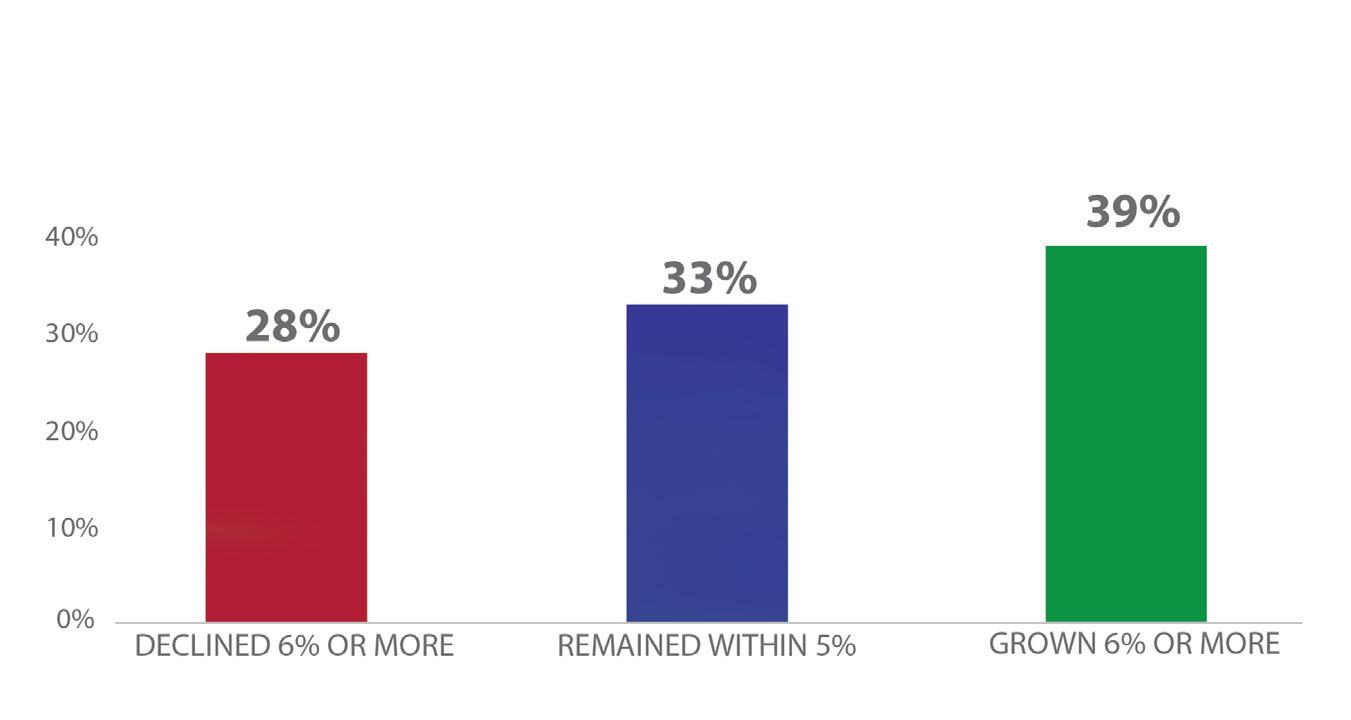
Fifty-four percent of pastors say fewer than 10 people indicated a new commitment to Jesus Christ as Savior in 2018, including 8% who had none.
In some ways, however, those numbers mask deeper evangelistic issues. When evaluating churches based on the number of conversions per
According to Protestant pastors:
Countryside | “Emulation trumps exhortation,” J.J. Washington preached. “Before you book a ticket across the ocean, please take the gospel first to your neighborhood.”
The Georgia pastor was met with frequent applause at the Illinois Leadership Summit Chicagoland in March. Washington was one of two keynote speakers at the event held at Brainard Avenue Baptist Church, which also included breakout sessions led by IBSA staff and Chicago pastors.
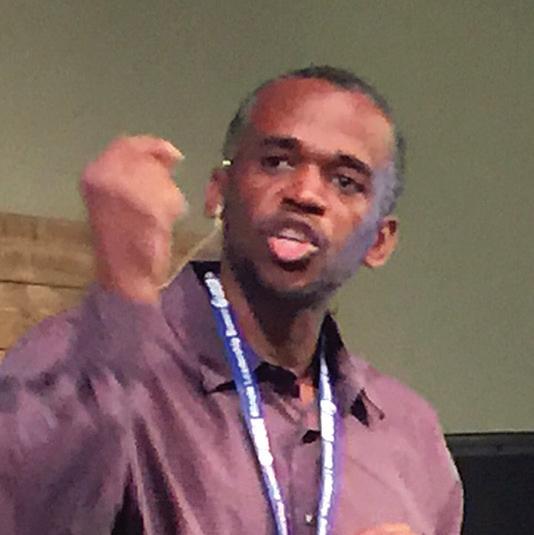
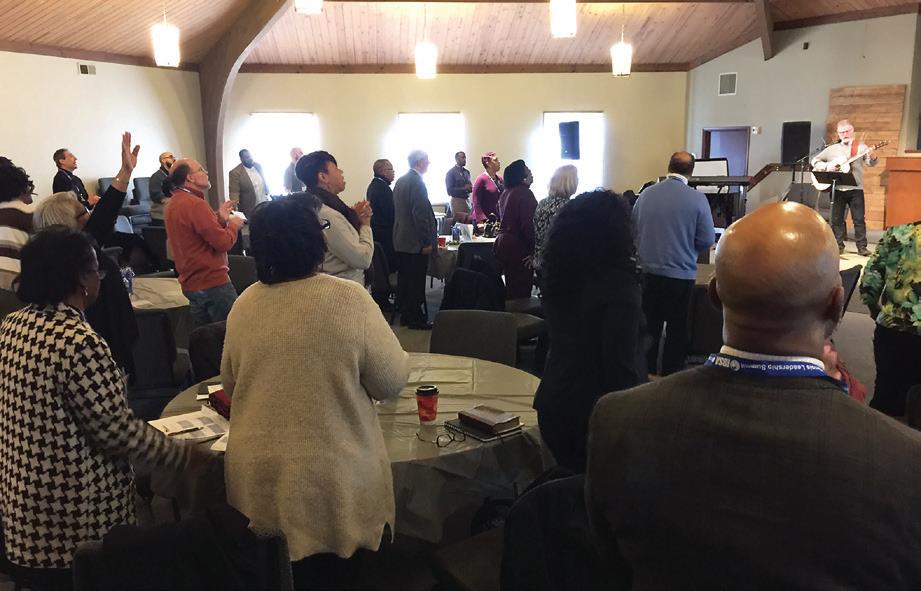
Washington described an Atlanta suburb that was mostly white and affluent until about a decade ago. It is now 60% African American and 25% Hispanic. And Austell Baptist Church was once large and thriving. When it dwindled to the point of desperation—50 people in a sanctuary built for 900—Washington was called from a staff position working with renowned Georgia pastor Johnny Hunt to lead this small group in revitalization.
His no-holds-barred style met resistance at first,
100 attendees, 67% had fewer than 10 per 100 people attending their church. Around a third (35%) had fewer than five new commitments for every 100 people attending their worship services.
Forty-six percent of smaller churches (fewer than 50 in worship services) say they had 10 conversions or more for every 100 in attendance, while only 18% of churches 250 and above meet that benchmark.

While there are no major differences between evangelical and mainline churches in terms of new converts, denominational differences do exist.
A majority of Pentecostal pastors (57%) say they saw 10 or more new commitments to Christ in their church last year per 100 attendees. The next closest denominations are Lutherans (39%), Holiness (38%), and Baptists (35%).
“Much work has been done to go deeper on measuring church health,” McConnell said. “But it is still helpful to look at the observable factors of ‘noses, nickels, and new commitments.’ Strategies, programs and rules-of-thumb work differently depending on the trajectory of a church.”
– LifeWay ResearchAccording to Protestant pastors:
but six months into a turnaround, the church is showing signs of life—reaching the neighborhood and its black and Hispanic residents. He showed photos of recent baptisms.
“The jury is still out on me,” Washington admitted. “The true test is the legacy a pastor leaves behind.”
His leadership message was cheered by the Chicago-area crowd. “The pastor’s role is to be the motor and the modeler,” he said. “We can’t lead from the back.” He said several times in his presentation, “I motor for the gospel!”
Teaching church members how to have gospel conversations was not his first move. At the beginning, he simply took two elderly white ladies on visitation, asking for prayer requests.
Washington recommended what he is leading his church to do:
• get into the neighborhood and knock on doors;
• get into the schools with sports programs and Bible clubs;
• get the church back into prayer by bringing requests to the altar;
• get diverse representation in the leadership and on the platform.
“What if we have over-complicated the gospel?”
Jonathan Hayashi asked in another session. The associate pastor from Troy, Mo., previously served
as worship leader for Uptown Baptist Church in Chicago. He urged the church leaders to focus on discipleship. “We cannot microwave disciples; they are a Crock Pot recipe. Maturity takes time.”
Hayashi is the author of a new book, “Ordinary Radicals.” He said creating a discipleship culture in the local church is, in fact, a leadership issue. “Evangelism rises and falls on leadership,” Hayashi said, and making disciples will only become a priority for the church if it is a priority for the leaders.
“Don’t announce the revolution by saying ‘We’re gonna make disciples!’ Hayashi advised. “Just start doing it.” His emphasis on leading by serving as a model dovetails with Washington’s approach.
“Either you are making disciples,” he said pointedly, “or you are making excuses. Which are you?”
–
Eric Reed‘Motor for the gospel’

This report includes contributions received by the Illinois Baptist State Association through the first quarter of 2019. For questions about this report, contact the IBSA Church Cooperation Team at (217) 391-3106, e-mail JeffDeasy@IBSA.org, or write to P.O. Box 19247, Springfield, IL 62794-9247.

Our vital cooperation
Since 1925, the Southern Baptist Cooperative Program has supported missions and ministry at local, state, national, and global levels.
“The mission of the local church is to do her part to ensure that vision of heaven (in Revelation 7:9) is fulfilled. Thankfully, Southern Baptists have known from the formation of our convention— and still know today—that the most effective way to carry out that mission is through churches cooperating together.”
PaulChitwood, president, International Mission Board
“It’s like multiplying our labor, like building a fence two miles long together, rather than a quartermile if you had to do it alone. We see the Cooperative Program as a way we can reach beyond our abilities.”
Cahill,
43.5% 56.5%
When your church gives a percentage of tithes and offerings through CP: is forwarded to national and international SBC causes stays in Illinois to plant new churches, train churches in missions and evangelism, and develop the next generation of leaders.

“I will say again and again that our work together as Baptists to take the gospel to the ends of the earth is dependent ultimately on our ability to prioritize and accelerate our giving through the Cooperative Program.”
Ronnie Floyd, president & CEO, Southern Baptist Executive Committee Go
Carmi First, Carmi 32.03 Sandy Creek, Tamms 32.00 Elkville, Elkville 31.83 Tabernacle, Decatur 31.63 New Song Ministries, Zion 31.50
Ten Mile, Mc Leansboro 31.21 Cutler First, Cutler 31.18
Starting Point Community, Chicago 30.77 Twin Oaks, Sleepy Hollow 30.32 Metro, Edwardsville 30.00 East
the missionaries and ministries CP supports.
Golf Road, Des Plaines 33.60
Mt Zion, Piasa 32.87
Litchfield First, Litchfield 32.40
S I Country, Makanda 32.26
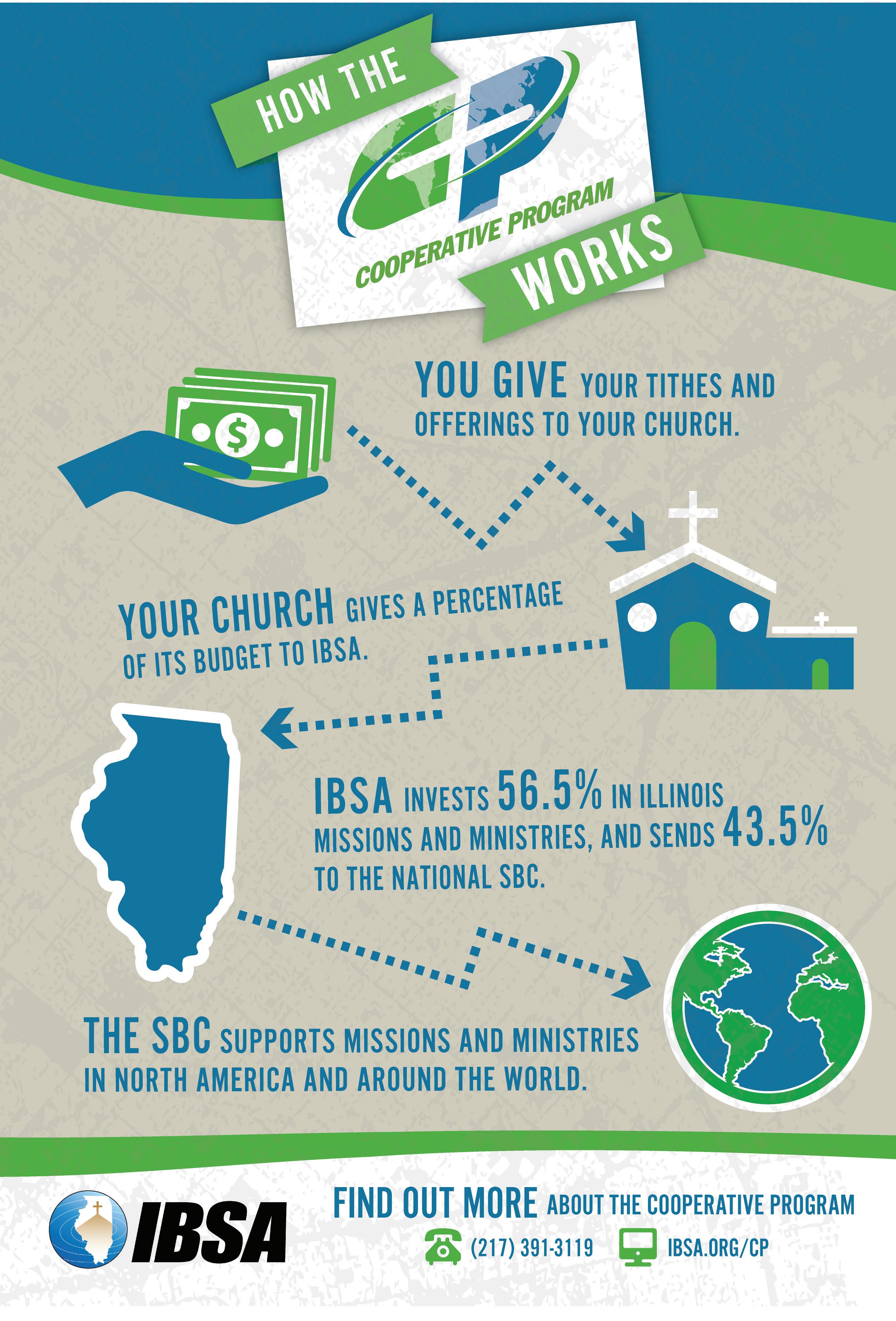
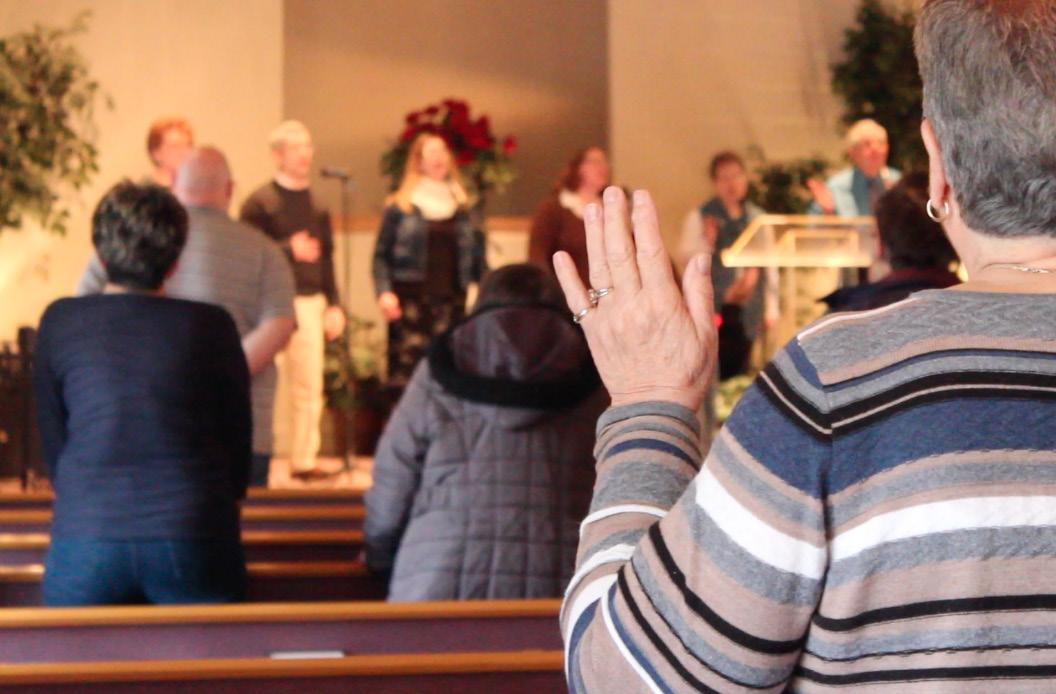
When Mike Young first laid eyes on Streator in 2016, he saw a small prairie town in the midst of vast farmland. But he also saw a community in great need of the gospel. Young, who moved to town to manage IBSA’s northern Illinois camp facility, soon discovered that much of Streator was still unchurched. He started praying God would raise up a church to fill that void.
 BY ANDREW WOODROW YOUNG
BY ANDREW WOODROW YOUNG
When Young started looking for a church to join, there was one that caught his eye every time he’d go into town. “I would pass a church right on the edge of town called Calvary Baptist,” he said. “The building looked rough, and there were bushes growing all around it. It just looked like it was closing down.” Many people in town confirmed what Young had thought— that the church was on its way out.
Still, every time he passed Calvary, something kept tugging at his heart.
“Calvary Baptist Church was a long-standing church in the community,” said Mike Blakemore “It goes way back into the ‘50s, I believe.”
Blakemore and his wife started attending Calvary in the early 2000s; he eventually became an elder. “It was a great church, great pastor, great fellowship,” Blakemore said. But after their pastor retired, “that’s when the struggle began.”
The Southern Baptist church went through a series of interims and people just to fill the pulpit, and Calvary’s numbers started dwindling. Soon, wear-and-tear to the church’s building became evident, with mold growing inside the walls and roof.
By the end of 2015, with finances running low and numbers still dropping, the auditorium ceiling caved in after a severe hailstorm. “After much prayer and a
The members of two Streator churches credit God with uniting their congregations under a new name: New Beginnings.

lot of discussion, we decided to vacate the building,” Blakemore said.
A few miles away, Streator’s First Baptist Church had its own problems. The Conservative Baptist church was founded not long after Streator was incorporated in 1868. Longtime member Linda Abbot speaks fondly of her church. “I have a great, great grandfather who helped start this church,” she said. “My mother was part of this church. And when I was born, I was brought into it as well. I’ve been here ever since.”
At 13, she dedicated her life to Christ at the church. She brought her childhood sweetheart, Ken, to First Baptist where he, too, came to know Christ and eventually became an elder. The Abbots married at First Baptist and have raised their own children there.
“But in the years that we had been coming here,” Linda Abbot said, “we noticed the numbers steadily declining. And we could just see things falling apart.”
The numbers continued to decline until they were down to almost 20 people, forcing the once large church to close down its main building and move worship into the fellowship hall, a standalone, neighboring building.
The move was made to sustain the church, Ken Abbot said, with the knowledge that if finances dwindled to a certain level, the church would dissolve and its Conservative Baptist denomination would take over the building.
Meanwhile, Calvary sat empty for almost a year while worshippers met in homes or rented spaces, praying all the while for direction. “We had just been going from place to place, and the fear that came along with that is, how long is this going to work?” said deacon Mark Martin
But, he added, the church’s predicament drove them closer to God. “And that’s what it did to everybody that was involved,” Martin said. “Because God doesn’t bring about situations like these to drive you away from him. There might be problems, but they are meant to bring you closer to the Lord.”
Still, the uncertainty was unnerving. After months of worshipping in different places, Calvary gathered for a prayer meeting in a home one Wednesday afternoon, bringing their future and their tattered building to the Lord.
Answered prayer
It was that same Wednesday afternoon when Mike Young, unable to shake the tugging in his heart, decided to finally investigate the rundown church building on the edge of town. He pulled
into the church’s parking lot, found a phone number on the door, and called. “I explained who I was and asked if there was anything I could do. I thought maybe they would need help with their building. I could help with that,” said Young, who has facilitated extensive renovations at the camp.
“Right then, they stopped that prayer meeting and they answered the phone,” Young said. “They didn’t have a pastor, they didn’t have a building, but they still had that core group of people.”
The group eventually called Young to serve as interim pastor, sparking a new beginning that would soon include First Baptist. That church was still without a pastor, and wondering what to do with their building. That’s when they heard about Calvary.
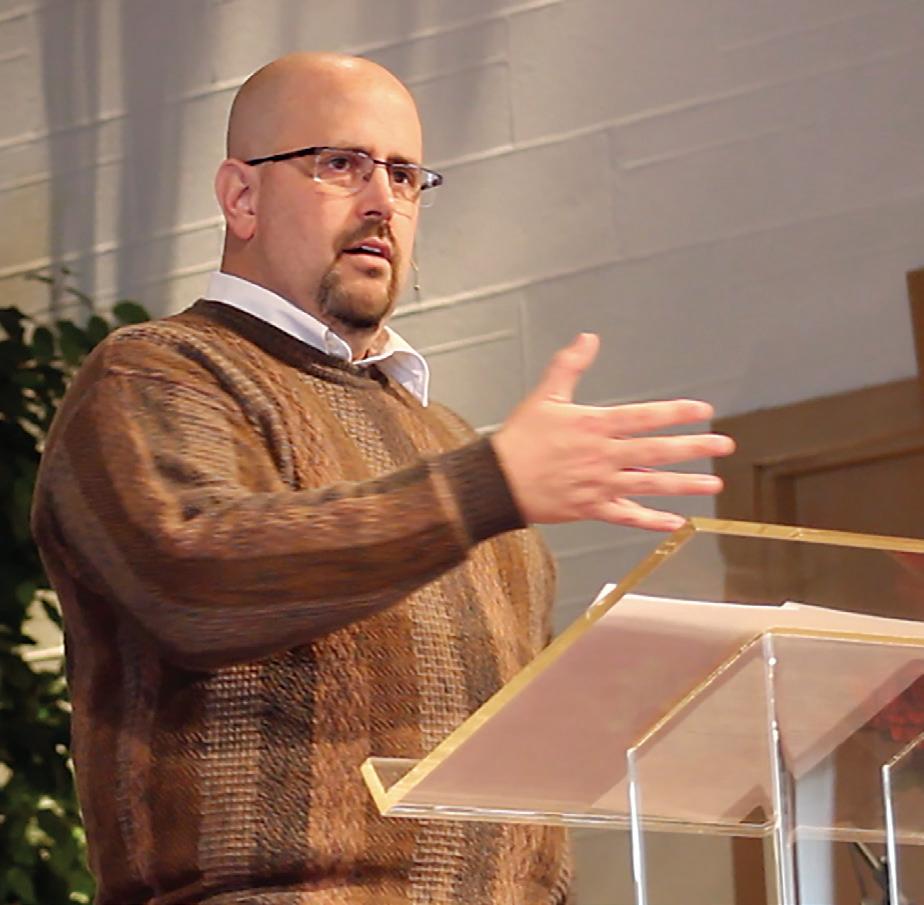
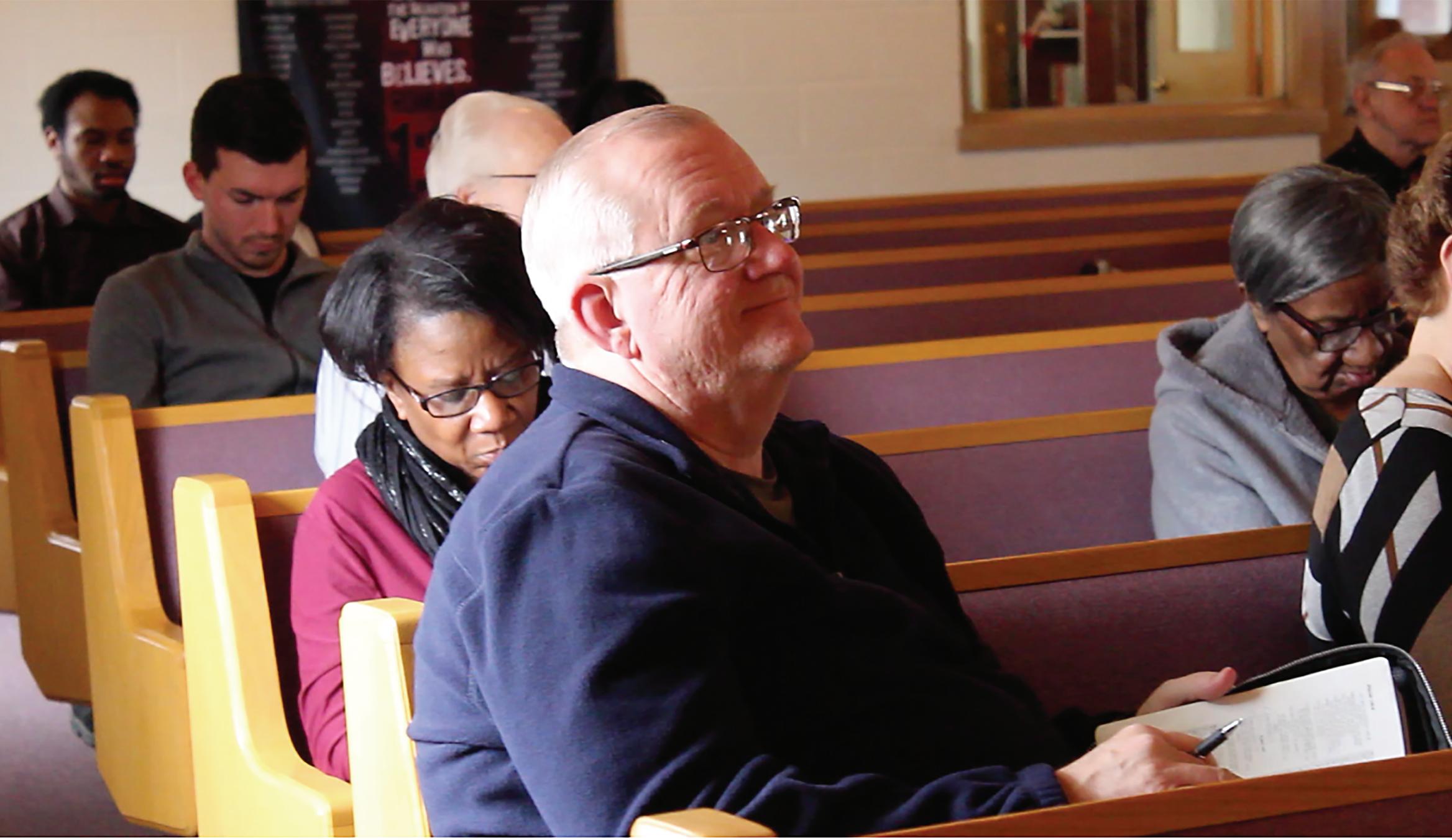
“When we heard that Calvary’s roof caved in and they were without a building,” Ken Abbott said, “we started praying for them. And while we didn’t know it at the time, they, in turn, started praying for us too because of our situation.”
“It was a challenging year for all of us,” said Tim Walter, an elder at First Baptist. He and Abbot extended an invitation to Calvary to worship with them.
“We were two churches in need of each other,” Walter said. “They needed a church home. And we had facilities, but we weren’t using them because our building was pretty much all closed up.”
Calvary accepted the invitation, and the two churches held a worship service in First Baptist’s fellowship hall in January 2017. “Over time as we met,” Young said, “worshipping together became so sweet, and the fellowship was just excellent.”
At first, each church collected their own offerings and maintained separate prayer lists and bulletins. Church meetings were held in separate rooms. After a couple months of worshipping together, each church wanted a more long-term plan, and eventually took separate votes on whether to merge. The votes were unanimous— both churches were fully in favor.
Despite apprehension on each side that the other would want them to conform to their traditions, Blakemore said each church put aside their wants and traditions, focusing instead on God’s desire and Streator’s need for a thriving church.
Some described the experience as a marriage, with two parties making sacrifices toward a greater good. “When both churches came together, each naturally had their own tradition,” Young said. “But like any marriage, you have to give and take. And the two were willing to do that. They were willing to rely on God and trust him for the results. That is the most important part.”
“We had to come together as a new beginning,” Walter said. “The past is gone; First Baptist had to cease, and Calvary had to cease. As Dr. Dan Eddington told us, we had to have two funerals and a wedding for this to work.”
Both churches credit Young and Eddington, director of missions for Three Rivers Baptist Association, for guiding them through the merger. But overall, it was God, through prayer, that gave the churches their success.
“We had to bathe the entire process in prayer,” Blakemore said.
The Abbotts agreed. “From the beginning we were praying for Calvary and, without us even knowing, they were praying for us,” Linda said.
In September 2017, the two churches officially constituted as one, with a new name: New Beginnings Baptist Church. The church affiliated with IBSA last November.
“It’s new beginnings in a lot of different ways,” Martin said. “Not only is it a name for two churches coming together and a new start for a ministry, but it’s a new beginning for a work in Streator, as well as a new beginning to the lost who come here.”
Mike Young continued as interim pastor until the church was able to hire their first full-time pastor. Aaron Jackson has been serving as pastor almost a full year. “We’re already seeing what God is doing through ministries here at New Beginnings,” he said. “This is a very unchurched area and we’re doing as much as we can to get involved in the community.”
The church has moved back into the main building and has seen significant growth. They’re reaching out to Streator through multiple ministries. Walter describes the church as a family with a singular focus on Christ. “What is our mission? To preach the gospel and to proclaim Christ to a lost world. That is why we exist. And that’s our direction for the church: so that everything we do is to glorify him.”
It began as an assignment. It ended as a milestone in my Christian life. My church history professor assigned the class to memorize the Apostles’ Creed. Obediently, I began to memorize this historic affirmation of the Christian faith word by word, phrase by phrase, truth by truth. Within a few hours I had committed the Apostles’ Creed to memory, ready when called upon in class to recite it. But even at that time I knew that something else had happened.
As a young man I realized that this ancient confession of faith is Christianity. This is what Christians believe—what all Christians believe. The Apostles’ Creed collapses time and space, uniting all true believers in the one, holy, and apostolic faith. This creed is a summary of what the Bible teaches, a narrative of God’s redemptive love, and a concise statement of basic Christianity.
All Christians believe more than is contained in the Apostles’ Creed, but none can believe less. Ancient Christians honored this creed. Martyrs recited this creed. The Protestant Reformers continued the use of the Apostles’ Creed in worship and the teaching of believers. There is such power in knowing that when we confess the Apostles’ Creed, alone or in corporate worship, we are declaring the truth of the Christian faith with the very words that gave early Christians hope, sent martyrs confidently to their deaths, and have instructed Christ’s church throughout the centuries.
It was the most important class assignment I ever had.
“I believe.” These two words are among the most explosive words any human can utter. They open the door to eternal life and are the foundation of the Christian faith. Belief stands as the very center of Christian faithfulness and is where Christianity begins for the Christian. We enter the faith and find eternal life in Christ by responding to the truth with trust—that is, with belief.
But Christianity is not belief in belief. It is belief in a propositional truth: that Jesus is the Christ, the Son of God, and savior of sinners. We do not believe in a Christ of our imagination but in the Christ of Scripture—the Christ believed in by every generation of true Christians. Furthermore, beyond belief in Christ stands belief in everything Jesus taught his disciples. Matthew recorded that Jesus instructed his disciples

to teach others to observe all that he had commanded them (Matt. 28:18–20). Therefore, there is no Christianity without belief, without teaching, and without obedience to Christ.
But where do we turn in order to know how to believe and what to believe? We turn first, of course, to the Bible, the very Word of God. The Bible is our only sufficient source and unerring rule of faith, and the Christian reflex to turn to the Bible is always right. The Bible is without error, totally trustworthy and true. It is the verbally inspired Word of God. Nothing can be added to it or taken from it. When we read the New Testament, we find the faith handed down from Christ to the apostles, those who were taught by Christ himself. Any form of belief that does not agree with the teaching of Christ to the apostles is false—a religion that cannot save.
The New Testament refers to authentic Christianity as “the faith that was once for all delivered to the saints” (Jude 3). Real Christianity is Christianity resting on truth—a faith of definite beliefs cherished by believers throughout the ages and once for all given to the church.
This is one of the great wonders of Christianity and explains why all true Christians hold to the same essential beliefs and have done so for two thousand years: as Christians, we believe what the apostles believed. And we want to hand that same faith to the next generation.
Further, we want to worship like the apostles and preach and teach like them. To do so, we turn first to the Bible, but we also turn to the historic and faithful summaries of the Christian faith, the most honored, historic, and universal of which is the Apostles’ Creed.
From its earliest beginnings, the church has faced the dual challenge of affirming the truth and confronting error. Over the centuries, the church has turned to a series of creeds and confessions of faith in order to define and defend true Christianity. The confession of faith we know as the Apostles’ Creed is one of the most important of these confessions. For long, unbroken centuries, it has stood as one of the most crucial teaching instruments of the Christian faith—along with the Ten Commandments and the Lord’s Prayer.
R. Albert Mohler Jr. is president of Southern Baptist Theological Seminary in Louisville, Ky., and author of the new book “The Apostles’ Creed” (Nelson Books, 2019).
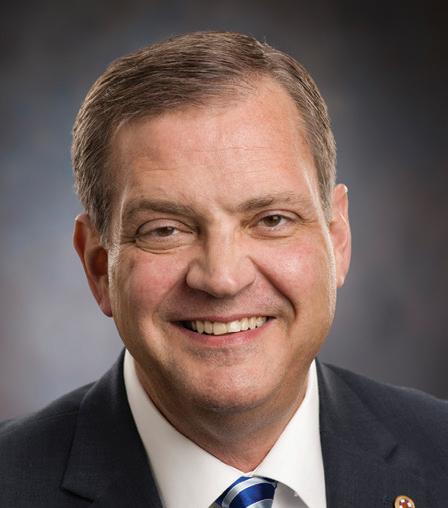
Read: Acts 8:26-40
Everyday is an opportunity to introduce someone to Jesus Christ, because everyday God allows us to be ambassadors of the Kingdom of God. In Acts 8, Philip was such an ambassador. When led by the Holy Spirit to go on what must have seemed an illogical journey, he immediately obeyed.
Because of his obedience, he was in the right place at the right time to tell someone about Jesus. The Holy Spirit led Philip to a highranking Ethiopian official who had been in Jerusalem to worship but left still searching for the living God. Despite the official’s power and prestige, he had a vast emptiness in his soul.

This Ethiopian man is like many of our friends, family, and co-workers today. They are socially successful and culturally religious. Sometimes they even read the Scriptures and seek the truth, yet they do not have saving faith in Jesus Christ. And each of them needs someone to show them the way. On the journey of life, they need roadside assistance!
They need a Philip to obey the Holy Spirit’s leading and come alongside them on the road of life to have a gospel conversation with them. They need someone who will help them understand the Scriptures, and they need someone who will tell them the bad news about their sin and the good news about our Lord and Savior Jesus Christ. And when they believe, they need someone to baptize them and then disciple them so they can go out and make other disciples.
Will you be like Philip and follow the Holy Spirit’s leading? Will you share the gospel with one person and pray for them to be saved? On the road of life, we all need roadside assistance.
Prayer Prompt: Father God, we were lost and you found us; we were broken and you healed us; we were dying and you rescued us. Help us to follow in your footsteps and look for daily opportunities to share the gospel with those in need.
Keith Halsey
Mitchell Keith Halsey, pastor of Raymond Baptist Church, died April 7 at the age of 55. His wife, Carmen, is IBSA’s director of women’s ministry and church missions.
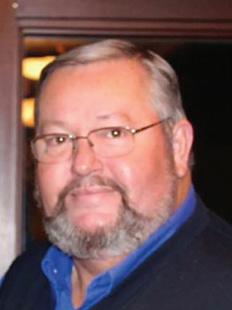
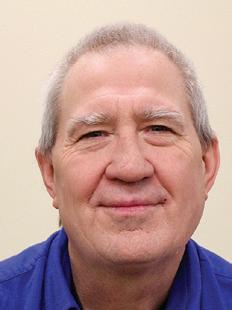
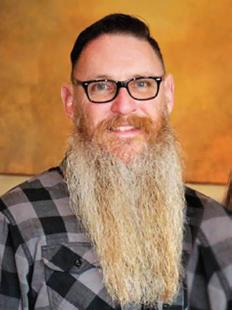
In social media posts and stories shared by IBSA staff, Halsey was remembered for his commitment to missions, especially in the Dominican Republic, and his faithfulness to the calling of God in his life.
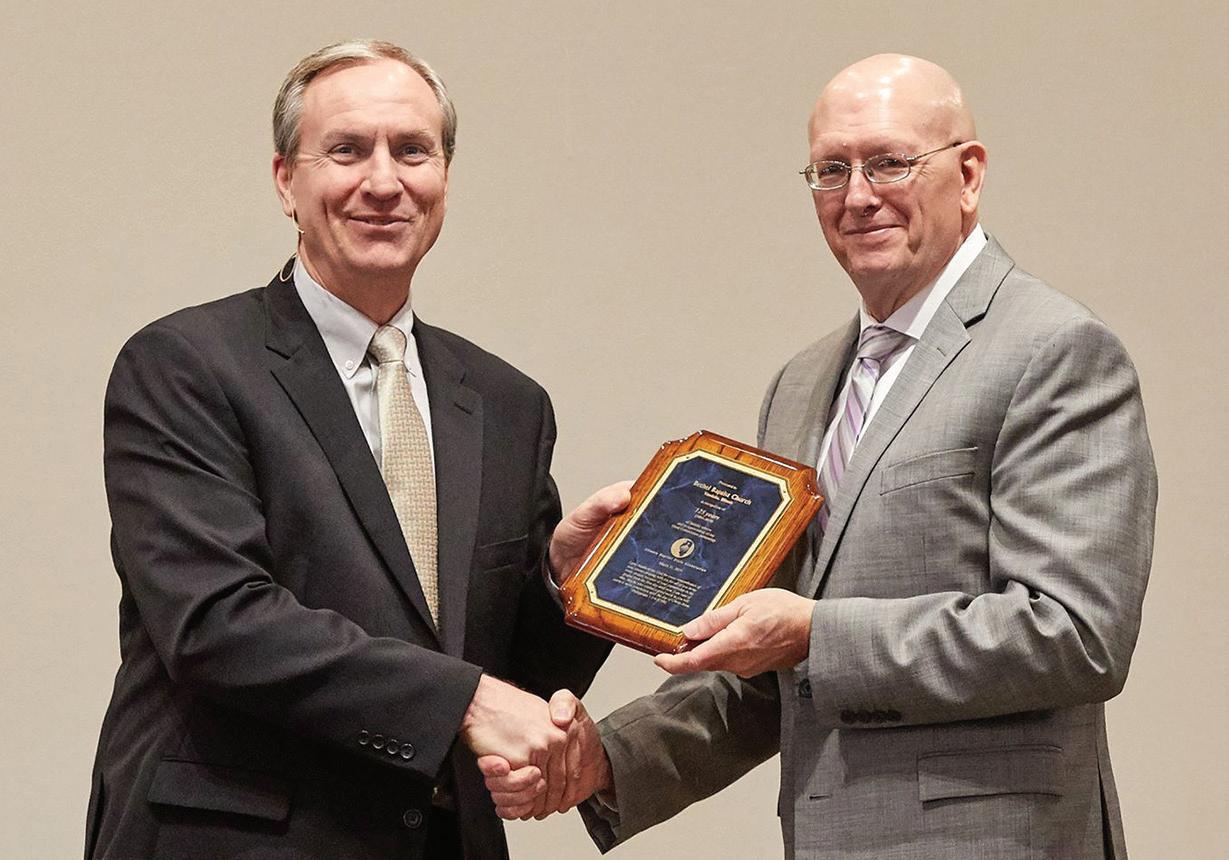
“I served as Keith’s pastor before he met Christ and for many years as he grew to become the man that God called him to be,” said IBSA’s Mark Emerson. “I saw him keep saying yes to God as he began to serve the church in various ways, then as a deacon, a pastor, and a missionary.”
Halsey pastored two IBSA churches, Roanoke Baptist in Springfield from 2010 to 2012, and Raymond Baptist since November of 2014. He is survived by his wife of 34 years, Carmen; sons William Joseph (Sarah) Halsey and Jonathon (Ashley) Halsey; mother, Mary; brother, Scotty; mother-in-law, Rose Bryant; 12 grandchildren and another grandson on the way; and many nieces, nephews, and others.
Mary Lou Wootton
Mary Lou Wootton of Springfield died April 7 at the age of 82. Raised in southern Illinois, she assisted her husband, James, with his career in education administration serving in Korea and China for 28 years. Her work with the Korean Women’s Missionary Union included teaching English to Korean women and sharing the Bible.
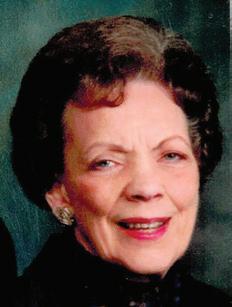
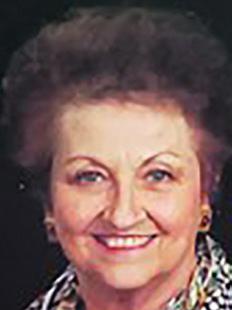
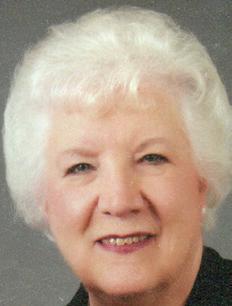
She was preceded in death by her sons, Joseph Wayne and Mark Dudley Wootton; her daughter, Melissa Ann Phillips; her parents; and one sister, Suzanne Teegarden. She is survived by her husband of 62 years,
James; children James L. (Jean) Wootton II, Pam (Paul) Hickey, Sherry (Doug) Holliday, and Natalie (Steve) Holliday; son-in-law Doug Phillips; 11 grandchildren; seven great-grandchildren; and two siblings.
Donna Brewer
Donna J. (Merrick) Brewer of Fairview Heights died March 27 at the age of 76. She served two terms as president of Illinois Woman’s Missionary Union (WMU), and in that capacity, also served as a vice president on the national WMU Executive Board. She served on Illinois WMU mission teams in Puerto Rico, Paris, and Hawaii, and was deeply committed and involved in missions and music at her church, Winstanley Baptist in Fairview Heights. Brewer was preceded in death by her husband, James F. Brewer; son J. Scott Brewer; and parents Eugene and Mildred Merrick. She is survived by her daughter, Michelle (Steve) Campbell; two brothers; two grandchildren; and one great-grandson.
Betty Molen
Betty Ann (Morgan) Molen of Brighton died April 1 at the age of 84. She and her husband, Pastor Darrell Molen, had been married for 62 years. A graduate of Union University in Jackson, Tenn., Betty Molen was an artist, baker, and seamstress. In 2018, her church, Bunker Hill Baptist, celebrated her 60 years as a Sunday school teacher. She also served as a clerk for IBSA and Macoupin Baptist Association, and was a member of Woman’s Missionary Union for many years.
Along with her husband, Molen is survived by children Candace (Richard) Stuckey, Jan (Brent) Kessinger, and Darla (Chad) Bennett; seven grandchildren and step-grandchildren; and two great-grandchildren.
Vandalia | Bethel Baptist Church marked its 125th anniversary with a March 31 celebration of the Lord’s faithfulness. “The editor from the local paper interviewed me after the service and asked me what the secret was that had kept Bethel alive and going for 125 years,” Pastor Ben Foxworth wrote on his blog, The Equipping Word. “I simply told him it was God, it was the people whom God had brought to Bethel over the years.
“God made the day, God established the church, and God made us part of his church through Jesus Christ. It was, and is, God’s day, and we rejoiced and were glad in it.”
on ministry positions at IBSA. org/connect.
Send NetworkiNg items to IllinoisBaptist@IBSA.org.
The IBSA Church Communications Team is seeking a summer intern to assist with writing, editing, interviewing, multimedia reporting, and video production. Applicants should be undergraduate or graduate students in the Springfield area, with excellent verbal and written communication skills, and good knowledge of web and social media. This position is a paid, hourly position of 20-30 hours per week for 6 to 10 weeks, with some schedule flexibility between mid-May and August. IBSA will receive applications through April 30. Send resumes to the attention of Jeff Deasy at JeffDeasy@IBSA.org.
Grace Baptist Church in Granite City is seeking an administrative assistant to work 35 hours each week. Send resumes and further inquiries to dwpreacher@gmail. com.
Temple Baptist Church in Canton is seeking a full-time pastor. Contact Dale Shaeffer at (309) 338-7000 for more information; e-mail resumes to TBC_ RESUMES@yahoo.com.
First Baptist Church, Mulberry Grove is seeking a bivocational pastor. Send resumes to First Baptist Church, P.O. Box 254, Mulberry Grove, IL, 62262.
Paul Kurrelmeyer is the new pastor of First Baptist Church in Red Bud. He recently served as a church planting pastor in Smithton for Calvary Church in Sparta. Before being called to gospel ministry, he and his wife, Mary, were Celebrate Recovery leaders for eight years. They have been married for 36 years and have two adult daughters, two granddaughters, and a grandson due in June.
Steve Ohl is the new pastor of First Baptist Church, Greenview. He was ordained March 31 at Living Faith Baptist Church in Sherman, where he has served as a Celebrate Recovery leader and been involved in mission trips and student camps. He also serves as an Illinois Baptist Disaster Relief “blue cap” supervisor. Ohl has received ministry training through Golden Gate Baptist Theological Seminary and the Heartland Baptist Network, headquartered in Springfield. He and his wife, Debi, have four children.
First Baptist Church, Maryville, Mo., seeks a full-time pastor. Must agree with the doctrinal statements in The Baptist Faith and Message (2000). Could you be the one God is leading to us? Send your resume to Pastor Search Committee, 121 E. Jenkins, Maryville, MO 64468, or by e-mail to fbcmaryvillemo@ gmail.com. Cutoff for receipt of applications is May 31, 2019.
Fellowship Baptist Church in South Chicago Heights is seeking a pastor to lead this small congregation about 30 miles south of Chicago. Applicants must hold true to the beliefs of The Baptist Faith and Message (2000), and the high calling given to us by the Lord Jesus Christ. Position would be bivocational to start; salary available upon request. E-mail resume and cover letter to: resume. fellowshipbaptistchurch@gmail.com.
April 16: Emmanuel, Carlinville

April 30: FBC Salem
May 2: Unity, Vandalia
May 14: Northside, Dixon
What: Quality, free training in women’s and men’s ministry, worship, students, outreach, leadership development, Sunday school, safety, and more Register: IBSA.org/TrainingNight
April 7-28
One GRAND Month
What: State-wide emphasis on evangelism and baptisms
Info: IBSA.org/Evangelism
April 26-27
Annual Women’s Conference
What: Enjoy a time of spiritual renewal and fellowship at the women’s event of the year! Increase your awareness of ministry and missions opportunities and training resources.
Where: Crowne Plaza Hotel, Springfield
Cost: $30 per person
Register: IBSA.org/Priority
May 3-4
What: Training weekend designed for new and experienced volunteers and chaplains; new volunteers will take Disaster Relief 101 beginning Friday evening; chaplaincy classes begin Friday at 1 p.m. Where: FBC Manteno Register: IBSA.org/DR
May 20-22
Southern Illinois Collegiate Retreat
What: An opportunity for students to connect with their peers, and be encouraged to fulfill the ministry Jesus has given them
Where: Lake Sallateeska Baptist Camp
Cost: $25 per person
Register: IBSA.org/Students

June and July
IBSA Splash Summer Camps

See ad below for more info
June 1 – August 3

Missions Spectacular
What: Summer missions emphasis with projects for children and adults, developed by local churches and associations
Where: Locations across Illinois
Cost: $20 per person
Registration coming soon: IBSA.org
June 8-12
What: Annual gathering of Southern Baptists, beginning with the day-long Crossover missions emphasis June 8 Where: Birmingham, Ala. Info: sbcannualmeeting.net
June 14-15
Father/Son Camp
What: Weekend of fun, fellowship, and superheroes
Where: Lake Sallateeska and Streator Cost: $40 per person Register: IBSA.org/Kids
QI’m getting married this summer, and I’m on Baby Step 4 of your plan. My fiancé is getting onboard with your advice, too, and she’s currently in the process of paying down her student loan debt. Would it be a good idea to go ahead and put most of my emergency fund savings toward helping pay off her debt now?
AYou’ve got a generous heart, and I know you love this lady, but I wouldn’t recommend being involved in paying any of her debt until after the wedding. At that point, you two are joined together as one, and the concepts of “mine” and “hers” and “his” disappear. It all becomes “ours,” and you can adjust your money situation to reflect your marriage and your financial makeover as a couple.
Make sure that “we” have an emergency fund of at least $1,000 in the bank at that point. Then, if you’re both in agreement on the issue, you can throw the rest of what you previously had in your emergency fund at the debt. Both of you can also pile up cash between now and the big day, so that when you’re “official,” you’ll have even more cash on hand.
Congratulations, and may God bless your lives together!
Financial advisor Dave Ramsey is a prolific author and radio host.

QMy husband and I are 24, we’re debt-free, and we’re just a few weeks of saving away from having a fully-funded emergency fund. Each of us has a 401(k) plan at work, and right now we’re concentrating on life insurance purchases. You always recommend term insurance, but how long should the coverage last?
ACongratulations on being super smart with your money! It sounds like you two are starting out on the right foot.
Generally, I recommend 15or 20-year level term policies— unless you have children. Since you didn’t mention any kids, I can only assume they’re not in the picture at this point. However, if you two decide to grow your family in the future, I’d advise converting those to 30year term policies. You’ll want the insurance there to protect everyone in the family, until the kids are grown and out on their own. In the years after, continued saving and wealth building will lead you to a point where you’re both self-insured. You two have done an excellent job with your finances. Keep up the good work!
To register go to Camps begin June 10 and run through July 12 Lake Sallateeska and Streator Baptist Camps
Back-to-school is a great outreach opportunity for churches in August, but how about celebrating students, parents, and most of all, teachers, currently in the middle of the long slog to Memorial Day? Plan outreach now to mark the end of the school year, with a focus on serving people who serve families all year long. Here’s one way: Provide snacks or lunch for a Teacher Work Day. This idea could work well at the end of the year, when many schools host work days for teachers cleaning out their classrooms. Package the treats with a thank-you note and simple flyer with upcoming dates, including Vacation Bible School or kids camp.
– FactsandTrends.net

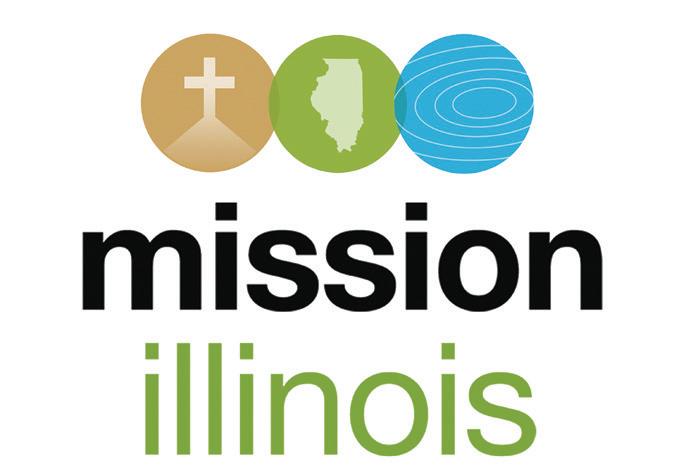
Looking for ways to help parents and their kids grow together in their faith? Consider a family mission trip, says IBSA’s Jack Lucas. It’s not the easiest trip you’ll ever plan, the director of next generation ministries acknowledges. But the benefits to families and to the church overall outweigh the challenges—here’s why:
Members of the same family take a week away to serve together, minimizing distractions from home.
A family mission trip positions parents as the primary disciplers of their children. They’re able to live out the things they’re teaching at home, and model for their children what it looks like to live life on mission.
Relationships are at the center of family mission trips, which makes them ideal for Millennials and Gen Z.
Not only do these trips cultivate Christian community in families, but also in the whole church.
Considering a family mission trip? Start planning well in advance, Lucas advises. Make sure there will be enough work for each age group represented on the team. The easiest solution is to plan a trip that involves a variety of activities, or at least two segments that can utilize older and younger volunteers—construction and Vacation Bible School, for example.
Once you decide on a location (IBSA or your local association can assist you with this), a pre-trip site visit will help confirm details like lodging, meals, and team assignments. Contact Lucas at JackLucas@IBSA.org or (217) 391-3135.
Location: Maroa
Focus: Residents of this rural community in central Illinois
Characteristics: Maroa is a town of 1,700 people with a focus on agriculture and related industries. Residents love their community, which forms a consolidated school district with nearby Forsyth.

Prayer needs: Pray for small groups currently meeting in Maroa, that they will meet needs of the community and local schools, and share the gospel with family and friends.
QI pastor a comfortable church. We’re not squabbling, we meet the budget, and people like the music. Why does that make me un-comfortable?
ASometimes a comfortable church can forget why they exist. Are you carrying out the Great Commission? Are lives being changed? Are marriages being rescued? Is the Holy Spirit at work in your midst? Perhaps you’re wondering why the devil isn’t attacking the church. Could it be because the church isn’t doing anything that makes him feel uncomfortable?

QOur deacons’ meetings have gotten contentious. No one knows why, but we bicker now and we don’t get much done. What would you do?
AAssign each deacon one or two ministry areas and let the meeting be a time of celebration and praise, inviting them to report ministry growth, future plans, challenges, etc. Ask them to meet beforehand with ministry leaders to discuss calendar events, upcoming special promotions, and praise reports. I think giving your deacons responsibility and accountability will help eliminate the conflicts.
QChelsea likes to rock the babies. She’ll come into the nursery during church and disturb a sleeping baby so she can pick it up. Chelsea’s not on the rotation, and she’s only 12. But her mother won’t stop her. Should I?
AEveryone loves a little baby! But the church has a responsibility to ensure the nursery is run in a professional manner. The discussion that needs to take place is not with Chelsea, but with her mother. Let her know that no one who has not been screened and had a background check is allowed in the nursery. While well-intentioned, her behavior isn’t acceptable and it’s her mother’s responsibility to explain it to Chelsea.
Pat Pajak is IBSA’s associate executive director for evangelism. Send questions for Pat to IllinoisBaptist@IBSA.org.
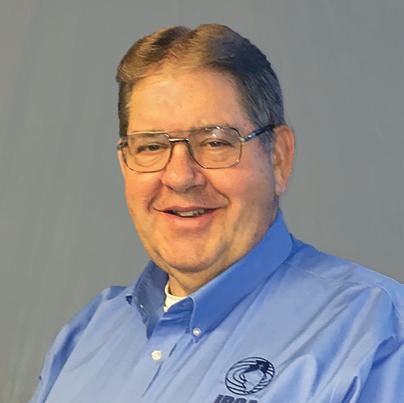
Understanding the world where we live and serve